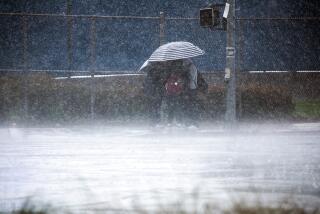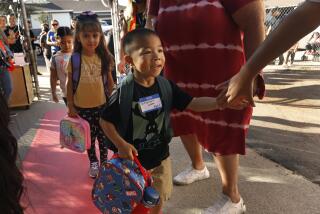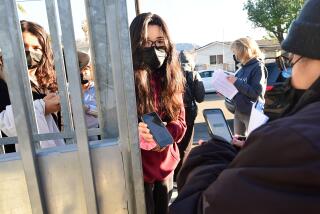Campuses closed for swine flu can reopen
- Share via
Students at more than a dozen Southern California schools temporarily closed because of the swine flu outbreak will be allowed to return to class this week, after the U.S. Centers for Disease Control and Prevention announced Tuesday that the new flu strain does not appear to be unusually severe.
From San Jose to San Diego, the news was met with relief on campuses, particularly high schools where administrators had to scramble in recent days to postpone up to two weeks of state and college prep testing, end-of-season athletic contests, musicals and major senior events, such as proms.
Many parents -- some voicing concern about their children’s health, others upset about the disruption -- had responded to the closures by flooding phone lines at school district offices and campuses, officials said.
“The calls ran the gamut, from, ‘You can never be safe enough’ to ‘You’re overreacting and ruining my kid’s life,’ ” said Jeff Baarstad, deputy superintendent of Conejo Valley Unified School District, where Newbury Park High School announced a weeklong closure Monday after finding a probable flu case. (Classes will resume at the Ventura County school today.)
Overall, nearly 40 schools in California canceled classes because of the flu outbreak. Nationwide, about 725 schools were closed Tuesday, affecting hundreds of thousands of students, according to the U.S. Department of Education.
Although the closures caused some hardship, school funding based on attendance will not be affected and all absences will be excused, state education officials said. Arrangements also will be made for students to make up any missed state tests.
School administrators, responding to criticism from some parents, said they had made their decisions to close based on recommendations from their respective county health agencies.
“It makes as little sense for us to question the department of health’s medical recommendation as it does for them to question our decision about what textbooks to use,” Baarstad said.
Many county health officers stood by their earlier decisions to shutter schools as a precaution.
“This is not a virus that we know about or that we’ve seen before,” said San Bernardino County health officer Dr. Maxwell Ohikhuare. “I think the appropriate thing was to be cautious, rather than to be sorry.”
Early on, health officials in Los Angeles County had voiced skepticism about the necessity of keeping students away from school and never ordered any closures.
There was no information to date suggesting that the H1N1 flu strain was any more serious than the typical seasonal flu, said Dr. Jonathan Fielding, director of L.A. County’s Public Health Department. In addition, canceling classes often doesn’t keep students from congregating and puts economic strain on parents who are forced to find child care at the last minute, Fielding said
“We focused on, I think, the right things: keeping kids who are sick out of school,” he said.
In the first case reported in the Los Angeles Unified School District, officials said Tuesday that a Fairfax High School student was probably infected with the swine flu, but said the school would remain open.
Tuesday’s revised recommendation by federal health officials was good news for principals like Athol Wong of Newbury Park. Less than 24 hours after she and her staff had rushed to wipe a week’s worth of events off the calendar -- including baseball and softball games and the prom -- nearly everything was back on track.
“I kept saying, ‘This is impossible,’ but I had to deal with it,” she said.
At Indio High School in Riverside County, Principal Rudy Ramirez said he had switched course three times.
“We adjusted, then adjusted again, then adjusted back to the original adjustment again, in a matter of three days,” he said, after the school was ordered closed for seven days on April 29, then for 14 days, then again for seven.
“Parents were so confused at times,” he said.
There and elsewhere, the changes disrupted SAT and Advanced Placement testing for many students. And Ramirez said that at his school, it nearly kept a track and field star from competing in upcoming league finals.
--
esmeralda.bermudez@ latimes.com
More to Read
Sign up for Essential California
The most important California stories and recommendations in your inbox every morning.
You may occasionally receive promotional content from the Los Angeles Times.












